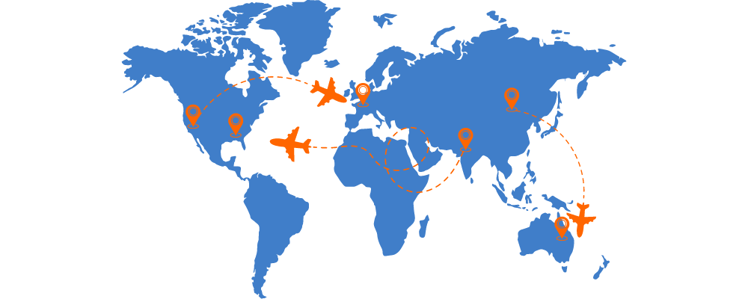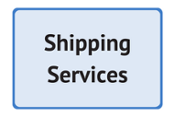“Buy locally, distribute globally” is a sound business strategy. It provides a level of control that allows you to maintain consistency across products or materials, manage the brand, and take advantage of bulk pricing.
That’s the theory, anyway. In practice, however, it’s not quite that simple or straightforward.
Most countries, and many manufacturers, have customs rules and other regulations designed to prevent materials produced in a foreign country from being imported and distributed in different locations. Generally, these rules are designed to protect local businesses from unfair labor practices, and the penalties can be harsh, both economically and in terms of wasted time and resources.
These regulations vary from country to country, region to region, making it difficult for companies to sort out which rules apply when, and what materials they apply to. That’s why it’s important to enlist the help of a shipping expert who understands these restrictions and can recommend alternative approaches that avoid the pitfalls while accomplishing the intended goal.
Brand Name Items Pose the Greatest Challenge
The most difficult items to import from the U.S. to foreign countries are materials from popular brand names like Nike, North Face, Tommy Bahama, and others. The restrictions are imposed by the manufacturers themselves as a form of protection.
For instance, Nike products produced in the U.S. cannot be exported anywhere outside the country, including elsewhere in North America. North Face is a little more lenient; materials produced in the U.S. can be exported to Puerto Rico, but that’s it. Tommy Bahama is slightly more open than North Face, adding Canada to the list of approved destinations, while Eddie Bauer includes Mexico as well.
Why are these manufacturers so strict about where their products can be exported? As globally recognized brands, companies like Nike and North Face have distributors all around the world. By prohibiting materials produced in the U.S. from being shipped to and sold in, say, the European Union, they are doing the financially responsible thing by protecting their distributors’ respective territories from foreign incursion. It’s a perfectly reasonable and understandable thing to do.
However, for other companies that want to spread their brand globally, these restrictions can wreak havoc on the production and distribution process. Navigating the various export and import regulations requires a fair amount of research—time that smaller companies don’t have the staff or resources to squander.
A Real-Life Scenario
Exactly how would these restrictions impact a business trying to extend their brand to a global audience? Here’s a scenario we’ve seen unfold many times over the years, victimizing companies that didn’t know—or failed to research—the shipping and import restrictions of the brand name supplier.
A Silicon Valley company wanted to promote a major product launch with new Nike Dri-FIT polo shirts, customized with the corporate logo, accompanied by the name and date of the launch event. The shirts would be distributed to employees around the world, including EMEA and APAC, as well as to key customers who participated in the best testing process. Additional shirts would be produced to accommodate new customers down the road.
To ensure consistency in the quality, coloring and branding of the shirts—as well as to take advantage of bulk pricing—the company purchased all materials from their main source in the U.S. and had them customized by a local vendor. The finished products were then prepared and packaged for distribution throughout the U.S. and around the world.
When the batch destined for locations throughout Europe landed in the U.K., they were intercepted, inspected, and confiscated by customs. The customs agents knew that Nike shirts, even customized ones, had to be produced by the local Nike distributor for the E.U. The entire shipment was destroyed, costing the company thousands of dollars and delaying the production and delivery of the shirts to their intended recipients throughout Europe.
This is not to suggest such a situation would play out the exact same way every time. Customs could have missed the shipment or failed to inspect it thoroughly. Or when discovered, the shipment might be returned to the company rather than destroyed, at least saving the materials themselves.
While there is no way to predict what will happen in every situation, the risks often outweigh the benefits of sneaking a shipment past the customs agent. The best approach is to be aware of the restrictions beforehand and develop a game plan that avoids the problems—and accompanying penalties—all together.
This is where a marketing fulfillment vendor with shipping expertise can play a critical role.

Shipping Expertise Navigates a Safe Path
Employing a marketing fulfillment and shipping expert like OnFulfillment pays dividends, helping companies that want to distribute materials globally develop a plan that accomplishes their goals while avoiding the pitfalls of import penalties.
The first thing the expert will do is look at the original plan and determine whether there will be any import issues based on the materials being shipped, their country of origin, and their final destination.
If there are any import restrictions that could impact the original plan, the shipping expert can then propose various options that will avoid or eliminate any potential problems.
For instance, if the brand name materials produced in the U.S. are prohibited from being imported at a planned destination, the shipping expert may recommend using a different vendor that offers comparable quality with no shipping restrictions. For instance, high-quality and cost-effective vendors like Champion and American Apparel can be produced and shipped anywhere in the world with no limitations. Substituting one of these vendors for the original brand name item will not only save money, but they can also be packaged, bundled, and shipped from the U.S. to any destination without have to worry about customs.
If the customer is insistent on the brand name items, the marketing fulfillment and shipping expert can leverage its global contacts to source the necessary items at locations around the world to eliminate any shipping issues. The vendor can then coordinate production and customization at multiple locations to maintain the quality and consistency the customer demands while keeping costs manageable.
Find the Right Expert
If shipping internationally from the U.S., whether brand-name apparel or any other product, it helps to enlist the help of a shipping expert to minimize costs and expedite delivery. Finding a shipping expert that also specializes in marketing fulfillment, branded promotional items, printing, and event management is even better.
OnFulfillment offers these services and more. The learn how we can assist with your shipping and marketing fulfillment changes, just visit complete the form to request a meeting.



